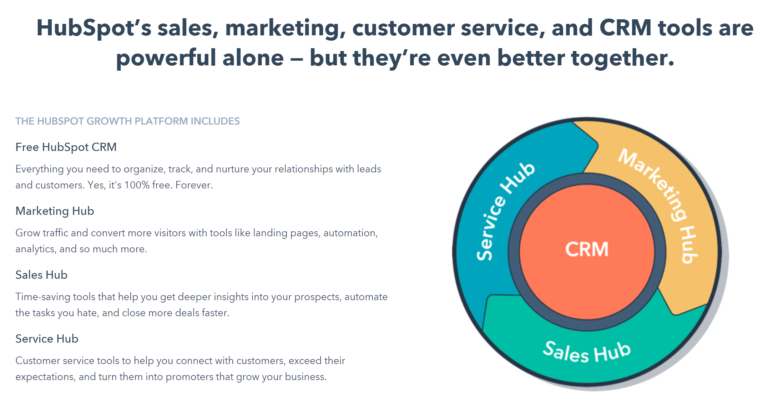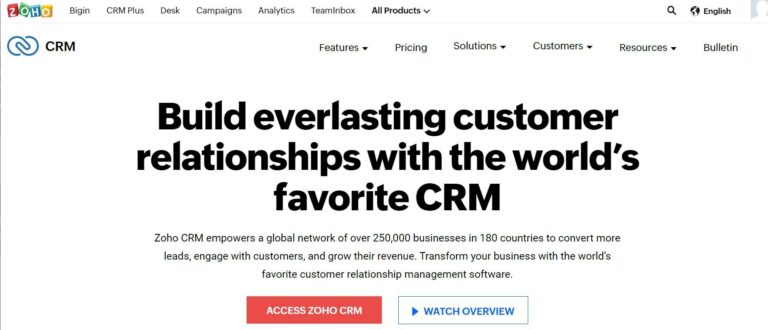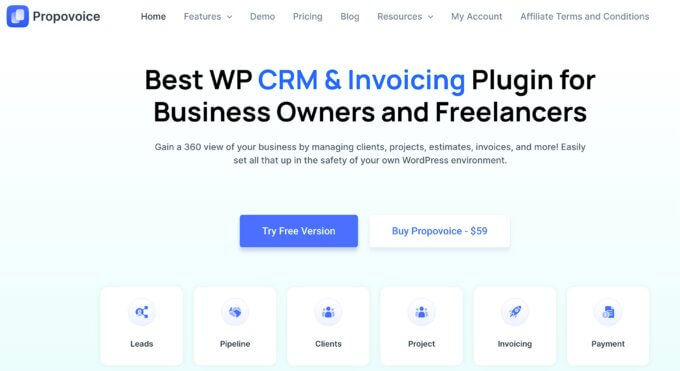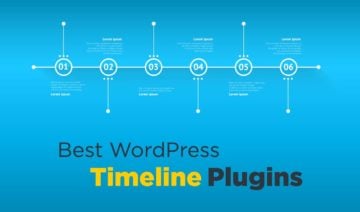Looking for a way to manage leads and customer relationships on your WordPress website?
A customer relationship management tool, or CRM for short, might be just the ticket. Though there are tons of huge SaaS CRM tools — with Salesforce probably being the most notable example — you can also bring the power of a CRM to your WordPress site with a dedicated WordPress CRM plugin.
That way, you won’t have to learn a new interface and add a whole new tool to your workflow just to manage your relationships with customers.
In this post, I’ve collected seven of the best WordPress CRM plugins, most of which offer a free version for you to try (as well as premium versions with more features, in some cases). For each CRM plugin, I’ll share its:
- Key features
- Integrations
- Pricing details
Let’s get started because your customer relationships won’t wait!
1. HubSpot

HubSpot is a popular inbound sales and CRM tool. It’s a six-billion-dollar company traded on the New York Stock Exchange, so it’s a little bigger than your average WordPress plugin developer.
But recently, HubSpot has been making a big push to get into the WordPress space, which is to your benefit if you’re looking for a WordPress CRM plugin.
One of the most attractive things about HubSpot has always been that the CRM functionality is 100% free. That carries over to the WordPress plugin, which is also 100% free. More on why a $6 billion company is giving away its tools for free later on.
Key Features
There are two parts to the puzzle when talking about the HubSpot WordPress plugin.
First, there’s the CRM itself. The CRM is not hosted on your site’s servers, but you can access contacts from inside your WordPress dashboard, so you don’t need to go to HubSpot every time you want to do some work.
As I mentioned above, HubSpot is a $6 billion company, so their CRM has plenty of power to help you manage your customers — you can learn about all the nitty-gritty details here.
This is a post about WordPress CRM plugins, though, so I’m going to focus mainly on what you get in the WordPress plugin beyond the ability to view contact details from your HubSpot CRM.
First, the really neat thing is that HubSpot’s plugin automatically syncs with any existing forms you’re using on your site, even if you created them with a different plugin. HubSpot will automatically add any emails that you collect via those forms to your CRM.
Then, HubSpot’s WordPress plugin also helps you create:
- Forms – If you don’t want to use a separate form plugin, HubSpot gives you a drag-and-drop form builder.
- Popups – Display your forms as popups.
- Live chat – Chat with your visitors via a live chat widget.
- Email marketing – Design and send emails with a drag-and-drop editor. You also get access to simple email automation. For example, you can send an automated email when someone fills out one of your forms.
And of course, all of those features automatically sync with your CRM. For example, if someone contacts you via your new live chat widget, HubSpot automatically adds them to your CRM.
Integrations
Beyond the neat feature that automatically collects leads from your existing WordPress forms, HubSpot also comes with 300+ integrations.
Because HubSpot is such a big player in the SaaS CRM industry, I don’t think you’ll find a WordPress-specific CRM plugin that comes anywhere close to the integrations that you can get with HubSpot.
In addition to a variety of specific integrations for email marketing, payment, and other services, HubSpot also sports a Zapier integration which lets you connect to any of the apps on Zapier.
So if integrations are what’s important to you, this might be the best CRM plugin for you.
Finally, if you have a WooCommerce store, you can use the HubSpot for WooCommerce extension from MakeWebBetter to sync your store with HubSpot. This is technically a third-party integration, but the HubSpot team has been heavily promoting it.
Pricing
As you learned above, HubSpot’s WordPress plugin and CRM are 100% free.
How is it free? Well, HubSpot basically wants to get you into its ecosystem so that you might eventually purchase one of its paid services for marketing, sales, or customer service. This handy graphic explains the basic gist of it — the core CRM is free, and HubSpot is hoping that one day you’ll want one of those hubs, which are paid services:

If you don’t want those extras? Well, you can just enjoy your free enterprise-grade WordPress CRM.
2. Jetpack CRM
Jetpack CRM, formerly Zero BS CRM, is a popular WordPress CRM plugin that was acquired by Automattic in August 2019. Automattic is the company behind popular WordPress properties such as WordPress.com, WooCommerce, and Jetpack.
Despite the name, you do not need to use the Jetpack plugin just to use Jetpack CRM. It’s 100% standalone and comes in both a free and a paid version.
Overall, it’s a very solid option if you want a native WordPress solution and need a customer-focused CRM. It does have some automation features, but automation isn’t the main focus like it is with the next entrant on our list (Groundhogg).
Key Features
- Manage unlimited customers.
- Build detailed customer profiles and segment them as needed.
- Create quotes/proposals and invoices (you can also view transactions per customer).
- View sales funnel analytics.
- Offer your own dedicated client portal.
- Integrate with tons of WordPress and SaaS tools.
- Create your own forms (or integrate with some form plugins).
- Send emails directly from Jetpack CRM.
- Dedicated WooCommerce integration to use it as an eCommerce CRM.
- Create your own custom automation sequences.
Integrations
Jetpack CRM comes with a number of integrations for other WordPress plugins as well as third-party tools. This is not the full list, but it should give you an idea of what you can integrate with Jetpack CRM:
- WooCommerce – This integration is quite tight since Automattic is also the same company behind WooCommerce.
- Email marketing services – Mailchimp, ConvertKit, AWeber, and more.
- Form plugins – Gravity Forms and Contact Form 7.
- Lead generation tools – OptinMonster, Exit Bee, and more.
- Payment systems – Stripe, PayPal, and more (you can pull your customer data from the payment tool).
Pricing
The core Jetpack CRM plugin is 100% free. The free version is already quite generous with its functionality. Without paying a dime, you’ll be able to manage customers, segment contacts, create quotes and invoices, offer a dedicated client portal, and more.
You’ll only need to pay if you want access to some or all of the premium extensions. To access the extensions, you can either purchase individual extensions or grab a bundle of multiple extensions.
Individual extensions cost $29 to $129 each, depending on the extension, with most extensions falling in the $49-79 range. Full access bundles start at $204 per year for access to all the extensions.
There’s also a cheaper Freelancer bundle that costs $132 per year and gives you access to four extensions: Invoicing Pro, Gravity Forms, PayPal Sync, and Woo Sync.
3. Groundhogg

Groundhogg is a native WordPress CRM plugin that aims to offer heavy-duty marketing automation features equal to SaaS tools such as ActiveCampaign and ConvertKit.
If you want to set up custom funnels and automation sequences, I think this is the best native WordPress CRM plugin that you’ll find. However, if you’re looking for a simple way to keep track of your contact details, I think it’s overkill, and you’d be better off with a tool such as Jetpack CRM.
One of Groundhogg’s standout features is its integrations with other WordPress plugins that let you set up automation sequences using triggers/actions. For example, you can trigger an automation sequence when a WooCommerce shopper purchases a certain product or adds a product to their cart.
Key Features
- Full contact CRM.
- Unlimited contacts.
- Add custom fields to store additional information.
- Flexible marketing automation.
- Drag-and-drop funnel builder for automation sequences. Build funnels from 18 core actions/triggers plus additional triggers for supported plugins (like WooCommerce).
- Send email campaigns (use a dedicated SMTP service for best results).
- Built-in reports and analytics.
- Compliance with GDPR and other privacy laws.
Integrations
As a native WordPress plugin, Groundhogg has integrations with some other popular WordPress plugins, such as WooCommerce, Easy Digital Downloads, LifterLMS, LearnDash, Gravity Forms, Divi, Elementor, and more.
It also supports third-party tools, including Zapier, ThriveCart, Twilio, HelpScout, and any SMTP service (for emails). Groundhogg also has dedicated integrations for email sending services, such as SendGrid, Elastic Email, and more.
Pricing
Groundhogg has a basic free version at WordPress.org, but you’ll need the paid version for the advanced automation features and integrations.
The premium plans range from $240/year for basic features on a single site to $480/year for all add-ons on up to five sites (or $960 for agency white labeling and up to 25 sites).
For a WordPress plugin, Groundhogg’s prices might seem expensive. But when you consider that it is going against other automation-heavy SaaS tools such as ActiveCampaign, ConvertKit, and HubSpot, I think it’s actually pretty cheap, especially because there are no contact limits. However, if you don’t need those automation features, you might want to consider a different WordPress CRM plugin.
4. FluentCRM

FluentCRM is another native WordPress CRM plugin that comes in both a free version at WordPress.org as well as a premium version with more features.
It offers a full contact CRM, some automation features, and a deep integration list. I don’t think it’s quite as flexible as Groundhogg, but it should still have enough automation power for a lot of users.
Overall, I think FluentCRM sits in-between Jetpack CRM and Groundhogg, which can make it a good option if you’re mainly looking for a contact CRM, but you still do want to be able to set up some automation rules and create email marketing campaigns.
Key Features
- Detailed contact CRM, including purchase history, support tickets, etc.
- Contact segmentation.
- Email marketing — send emails and track open stats.
- Design emails using the block editor.
- Autoresponders.
- Email marketing automation, with integrations for popular plugins.
- Built-in analytics.
- A/B testing.
- Built-in lead generation form builder.
- Integrates with other form plugins.
Integrations
With the premium version, FluentCRM has a number of integrations with popular WordPress plugins, mainly focused on eCommerce, LMS (learning management systems), membership, form, and automation plugins. Some examples are WooCommercce, Easy Digital Downloads, LearnDash, MemberPress, Paid Memberships Pro, Elementor Forms, Restrict Content Pro, and more.
It also works with any webhook connector, including Zapier, Integromat, Pabbly, and Integrately.
Plus, you can use the developer’s FluentSMTP plugin to send your emails using third-party providers such as SendGrid, Mailgun, Amazon SES, and more.
Pricing
FluentCRM has a basic free version available at WordPress.org.
If you want all of the features and integrations, there are three full-featured premium options. The only differences between the plans are the number of sites that you can use FluentCRM on:
- One site – $129
- Five sites – $249
- 50 sites – $499
5. WP ERP
Short for WordPress (WP) Enterprise Resource Planning (ERP), WP ERP aims to manage all aspects of your internal and external relationships.
On the external front, you get access to a detailed CRM where you can manage leads and interact with customers. And on the internal front, you get tools for human resources (HR) and accounting. For example, you can manage leave time for your employees.
Because this post is about WordPress CRM plugins, I’ll focus almost entirely on the CRM aspect of WP ERP — but just remember that there’s more to it than that if you like the idea of having those other features.
Key Features
Again, I’m focusing on just the CRM features, not the employee management or accounting tools.
- Helpful dashboard overview.
- Manage unlimited contacts, complete with life stage management, internal notes, and more.
- Advanced contact search.
- Send emails to contacts right from your WordPress dashboard.
- Activity log to easily log calls, meetings, emails, and texts.
- Separate area to manage B2B (business-to-business) relationships. You can add multiple representatives for a single company.
- Sync with a number of tools to import contacts.
- Add custom fields to collect additional information.
- Set up automated workflows to send emails and create contacts.
Integrations
WP ERP doesn’t have the largest integration list in the world, but it does offer integrations with several eCommerce, helpdesk, and other tools, including WooCommerce, Mailchimp, Salesforce, HubSpot, Gravity Forms, and more.
Pricing
The core WP ERP plugin is free and available at WordPress.org. WP ERP Pro starts at $12.99 per month. You can extend the core plugin’s functionality with premium extensions. If you also want to use the employee management features, each employee costs $3 per month. You can save 16% if you choose annual billing.
6. Propovoice CRM
Propovoice CRM is a native WordPress CRM plugin from Nurency, a digital agency. While the plugin hasn’t been around for quite as long as some of the other CRM plugins on this list, it has a very polished interface and plenty of features to help you manage your customer relationships, close deals, and collect payment via invoices.
It can work well for both solo freelancers and larger agencies and teams. However, it doesn’t have some of the more advanced marketing automation features that something like Groundhogg offers, so it’s better suited to working as a traditional sales CRM and invoicing tool.
If you want to test it out for yourself, you can access a live demo here.
Key Features
- Manage leads from a centralized dashboard. The free version has you work exclusively from the backend WordPress dashboard while the Pro version lets you create a frontend view.
- Manage deals, including deal pipeline functionality.
- Create and send estimates and invoices. You can send these via email as well as via chat platforms such as Messenger and WhatsApp.
- Set up automatic recurring invoices on a custom schedule.
- Accept payments from clients via bank transfer (free version) or credit card payments via PayPal or Stripe (Pro version).
Integrations
- Payment tools – the Pro version integrates with PayPal and Stripe to help you accept payments.
- Form plugins – the Pro version integrates with many WordPress form plugins to help you collect customer information, including Gravity Forms, Ninja Forms, WPForms, Fluent Forms, and Contact Form 7.
- Custom SMTP – you can use a custom SMTP provider to send emails from your CRM.
Pricing
Propovoice CRM comes in both a free version at WordPress.org as well as a premium version with more features.
Some of the main features in Propvoice CRM Pro include a frontend view, deal pipelines, invoice/estimate reminders, form plugin integrations, payment integrations (PayPal and Stripe), and more.
Propvoice CRM Pro offers both one-year licenses and lifetime licenses. A one-year license starts at $59 for use on a single site and a lifetime license starts at $199 for use on a single site.
7. Zoho CRM

Zoho CRM is a standalone SaaS CRM that you can easily integrate with WordPress via your favorite form plugin (including Contact Form 7, Gravity Forms, Ninja Forms, etc.).
It’s a pretty heavy-duty sales-focused CRM, complete with features such as lead scoring, deal pipelines, custom dashboards, and more.
However, because it’s not a native WordPress plugin, you’ll need to manage your CRM from the Zoho CRM cloud dashboard instead of your WordPress dashboard.
Key Features
- Lead management, including custom fields.
- Lead scoring.
- Deal management and pipelines.
- Workflow automation.
- Omnichannel (email, telephone, social, and customer portals).
- Built-in analytics and reports.
- Sales enablement, with quotes, partner portals, calendars, and more.
- Forecasting and territory management.
- Custom report builder.
- Lead nurturing and segmentation.
Integrations
Because it’s a SaaS tool, Zoho CRM doesn’t really have any built-in integrations with WordPress plugins. There is a third-party Zoho CRM – WooCommerce integration plugin, but that’s about it.
As I mentioned earlier, you can also connect most WordPress form plugins to Zoho CRM to add leads directly to your CRM. This might require third-party add-ons, but the list includes:
- Contact Form 7
- Gravity Forms
- Ninja Forms
- WPForms (but you need the Zapier add-on)
However, it does have tons of integrations with other SaaS tools, including Zapier, Trello, Zoom, Mailchimp, PayPal, Google Analytics, and lots more.
Pricing
Zoho CRM has a basic free plan that supports up to three users with limited features. After that, you’ll need to go with one of the paid plans, which are billed based on the number of users you have and the features that you need.
If you do need the paid plans, those start at $14/user/month with annual billing or $20/user/month with month-to-month billing. Here’s the full feature comparison of the free vs paid plans.
Which Is the Best WordPress CRM Plugin for You?
Now for the important question — how do you pick the best WordPress CRM plugin for your needs? While each tool has its merits, I do have two recommendations that I think make a good place to start.
First, if you want the most flexible, extendable CRM, then I think you should check out the HubSpot plugin. As I mentioned, HubSpot is a billion-dollar company, so solo WordPress developers just can’t compete with the depth of functionality that HubSpot offers.
Or, if you want a native WordPress solution that also offers advanced automation functionality, consider Groundhogg. With built-in integrations for popular eCommerce and LMS plugins, Groundhogg makes it super easy to create your own automation funnels and is more cost-effective than SaaS tools because it allows unlimited contacts.
Of course, if you don’t need all that functionality, then those tools might be overkill and actually feel a little overwhelming because they’re so flexible.
If that’s the case, I think Jetpack CRM might be your best bet. It’s a great lightweight, customer-focused CRM in a native WordPress package. Plus, with the Automattic acquisition, you can be confident that it will be around for the long haul and it has a very established team behind it. FluentCRM can also be a good option here as it’s a little more flexible than Jetpack CRM when it comes to automation.
Do you have any questions about how to pick the best WordPress CRM plugin for your needs? Ask away in the comments!






